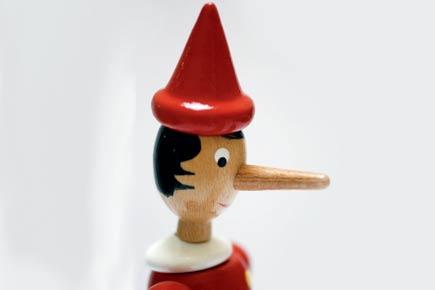Ooh, a long nose!” she would say, teetering on tiptoe to see if her first impression was correct. That was my daughter at five. I was mortified. But knew exactly where this came from.
 Ooh, a long nose!” she would say, teetering on tiptoe to see if her first impression was correct. That was my daughter at five. I was mortified. But knew exactly where this came from.
Ooh, a long nose!” she would say, teetering on tiptoe to see if her first impression was correct. That was my daughter at five. I was mortified. But knew exactly where this came from.
ADVERTISEMENT
Blame it on Carlo Collodi. If I laugh now, I was clearly embarrassed then. Charmed by the logic of that Italian writer’s fable, Pinocchio, she thought (with the lovely literalness of her age) it perfectly natural to go around looking for people whose noses stretched every time they lied. The community she happened to be born in provided her long-nosed Parsi men and women galore, with extra elongated snouts to review! After the six months that this game lasted, she arrived at a conclusion. Adults seemed to be sprouting the extended nose length, not kids — “So children are more honest than big people?” she asked.

Yes, I said. Secure knowing that she and her brother should squarely be counted among those ranks. I’ve made all the mothering mistakes most of us do. We’ve landed plop into parenting pitfalls in plenty. Yet, raising honest kids is something we’re pretty proud of.
How best to ensure they don’t end up long-nosed like Collodi’s wooden puppet boy? No better way than by being short-nosed ourselves.
Honesty begins at home and flawed role modelling is the biggest barrier to bring up truthful kids. Tempting, isn’t it, as thoughtless adults, to duck an unwanted phone caller saying, “Tell him I’m not at home.” Or scrawling that “Absent because unwell” note in a school calendar when the family actually hooks off for an out-of-town wedding.
Worse when we hide behind euphemisms. Sorry, whether you choose to call it a fib, white lie or murkier colour, a lie is still a lie. The truth is tough yet non-negotiable.
Of course, it’s easier criticising kids rather than investing in them. Therapists today say they’re tired of parents whining that their children lie straight-faced with impunity or are super secretive. Their advice: be worthy of earning young trust before expecting them to be open just because they are your kids.
What makes children
lie? Psychiatrist Pervin Dadachanji believes getting away with dishonesty reinforces it. Unchecked fibbing repeats and slips into habitual lying. Kids with poor self-esteem tend to tamper with the truth to feel good about themselves before others. But lying has long-term consequences. An “I didn’t do it” response to a window broken by a cricket ball could spiral to “I didn’t do it” for forging a signature.
Win the trust vote with help from three of Dadachanji’s practical suggestions:
Stay calm. Hysteria, screaming labels like, “You liar!” only give more reason to lie.
Attack the behaviour and not the child. Tell a kid you’re upset at the lie told to cover up an action (denial) rather than the act itself (not confessing to scribbles on a wall or feigning a headache to avoid homework).
Praise honesty. It’s important to let a child know you appreciate the truth owned up to. In these days of insane peer pressure, it’s no cakewalk keeping kids honest. Only fair to acknowledge this without taking it for granted.
As always, bright cues come dancing in from popular children’s culture. It’s a serious quality we’re talking about here but let’s lighten up. Introduce fun stories and films championing the truth with gentle humour without getting heavy-handed. The Berenstain Bears and the Excuse Note gets miles of smiles from the first few pages. Try both the book and movie of the ludicrously titled, Edwurd Fudwupper Fibbed Big, where Fannie Fudwupper’s brother cooks up such whopping phooey that the army, the air force and the dogcatcher arrive to reverse the damage.
Our all-time favourites include, among other gems of Dr Seuss, Horton Hatches the Egg. Both my kids loved hearing how the childless writer told people his philosophy on kids was basic — “You have ‘em and I’ll entertain ‘em.” He sure did. Seuss totally hooks readers with Horton’s antics and frolics to cheer the value of a life lived with honesty. Who can resist the refrain chanted throughout Horton Hatches the Egg: ‘I meant what I said and I said what I meant/an elephant’s faithful one hundred per cent!’
Write in to Meher at mehermarfatia@gmail.com
 Subscribe today by clicking the link and stay updated with the latest news!" Click here!
Subscribe today by clicking the link and stay updated with the latest news!" Click here!






